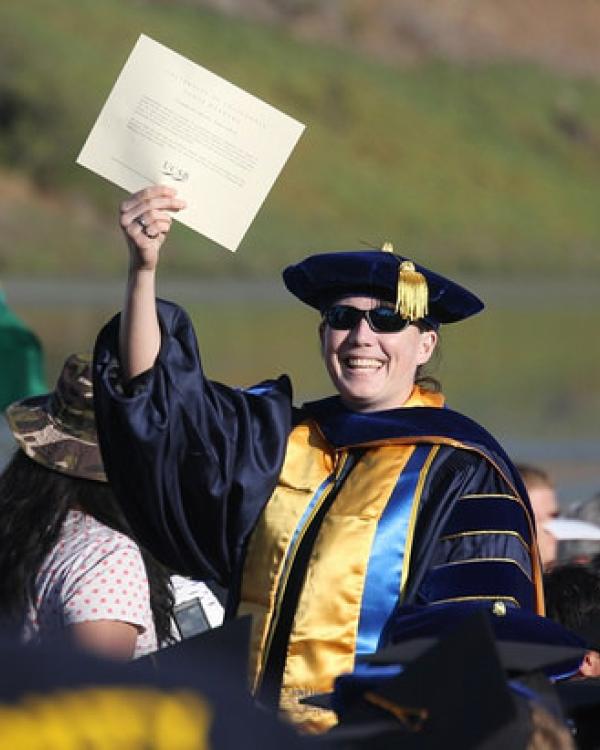
Torrey Trust receiving her diploma at the June 2014 graduation ceremony
Thirty-three doctoral candidates from UC Santa Barbara’s Gevirtz Graduate School took part in graduation ceremonies in the academic year 2013-14. Listed below are the new Ph.D.s and their dissertation titles.
Department of Counseling, Clinical, and School Psychology
Jenna Chin, “Examining and Predicting Longitudinal Trajectories of Behavioral and Emotional Risk in Students”
Rebecca Doggett, “Using the Pivotal Areas of Initiations and Self-Management to Target the Core Social Conversation Skills in Deficit in Adolescents with Autism”
Victoria Gonzalez, “Taking a Leap to Close the Gap: Early Academic Success of Low- Income Latino/a Children Facing Multiple Risks”
Rachel Hopsicker, “The Impact of Parenting Interventions on Family Functioning for Women in Residential Substance Abuse Treatment”
Won-Fong Lau, “Defining Parents’ Behavioral Involvement in Children’s Education: A Similar Phenomenon for English- and Spanish-Speaking Parents?”
Jocelyn Levitan, “Children Exposed to Domestic Violence: Examining the Role of Group Cohesion in a Group Intervention”
Pilar Sumalpong, “Non-Suicidal Self-injury among European-American and Latino/a-American Inpatient Adolescents”
Department of Education
Reem Alfrayan, “The Self-Efficacy of Businesswomen: Understanding Generational Cohorts of Saudi Arabian Advocate”
Hadar Baharav, “The College Readiness and College Outcomes of White and Latino Students: an Invariance Testing Approach”
Jesse Bernal, “A Case Study of an Intensive Retention Program for At-Risk First Generation, First Year University Students”
Monica Carmo, “Sustaining Innovation: Developing an Instructional Technology Assessment Process”
Jeri Custodero, “Anxiety and Test Anxiety: General and Test Anxiety Among College Students with Learning Disabilities”
James Ford, “Course Management System Interaction Analysis: A Study of Current Adopters of an Established Course Management System”
Cathy Gaspard, “Secondary Mathematics Student Teachers’ Questions and Responses in Whole Class Discussions: Influences on Instructional Decisions”
Melinda Kalainoff, “Making Visible the Complexities of Problem Solving: An Ethnographic Study of a General Chemistry Course in a Studio Learning Environment”
Jung Sun Kim, “Training Paraprofessionals to Improve Social Skills in Students with Autism Spectrum Disorders”
Brittany Koegel, “Targeting Prosodic Atypicalities Using Self-Management for Individuals with Autism Spectrum Disorders”
Jessica Phillips, “Eating Disorders and Body Image on College Campuses: Counselors’ Experiences with Diverse Student Populations”
Ravy Lao, “‘We Build Up This Community Together’: Examining Khmer Heritage Language Learning in the Context of Asset-based Community Development”
Daniel Mann, “The Relationship Between Ethnic Identity and Residential Hall Preference”
Mavel Marina, “University Internationalization: A Case Study on Faculty International Programming”
Susannah McGowan, “Embedding Threshold Concepts in a Large Lecture Course: An Examination of Uptake of Disciplinary Action”
Kyunghee Moon, “Preservice Secondary Mathematics Teacher’s Development of Mathematical Knowledge for Teaching and Their Use of Knowledge in Their Instruction”
Diane Morovati, “The Intersection of Sample Size, Number of Indicators, and Class Enumeration in LCA: A Monte Carlo Study”
Katherine Nilsen, “Graduate and Undergraduate Students’ Teaching Practices in a Place-Based Outreach Program”
Haley Orton, “Culture in a Writing Program: An Organizational Case Study”
Edward Ransom Jr., “An Exploration of Teacher Support for Performance Pay in Southern California”
Karen Sanchez, “Adult Learning in a Computer-Based ESL Acquisition Program”
Lauren Taylor, “Adding to the Pool of Methods for Program Evaluation: A Comparison of Latent Class Analysis and Propensity Score Analysis”
Ella Thompson, “Both Sides of the Interface: Building an Education Interface For a Digital Video Archive with an Interprofessional Group”
Torrey Trust, “A Cultural Historical Activity Theory Perspective of Teacher Learning in the Edmodo Math Subject Community”
Jamie Vaughn, “An Evaluation of English versus Spanish Language Choice During Conversation Training Intervention for Children with Autism”
Ornkanya Yaoharee, “Power and Politeness in Intercultural Workplace Communication: Some Implications for Teaching English as a Second Language in Thailand”